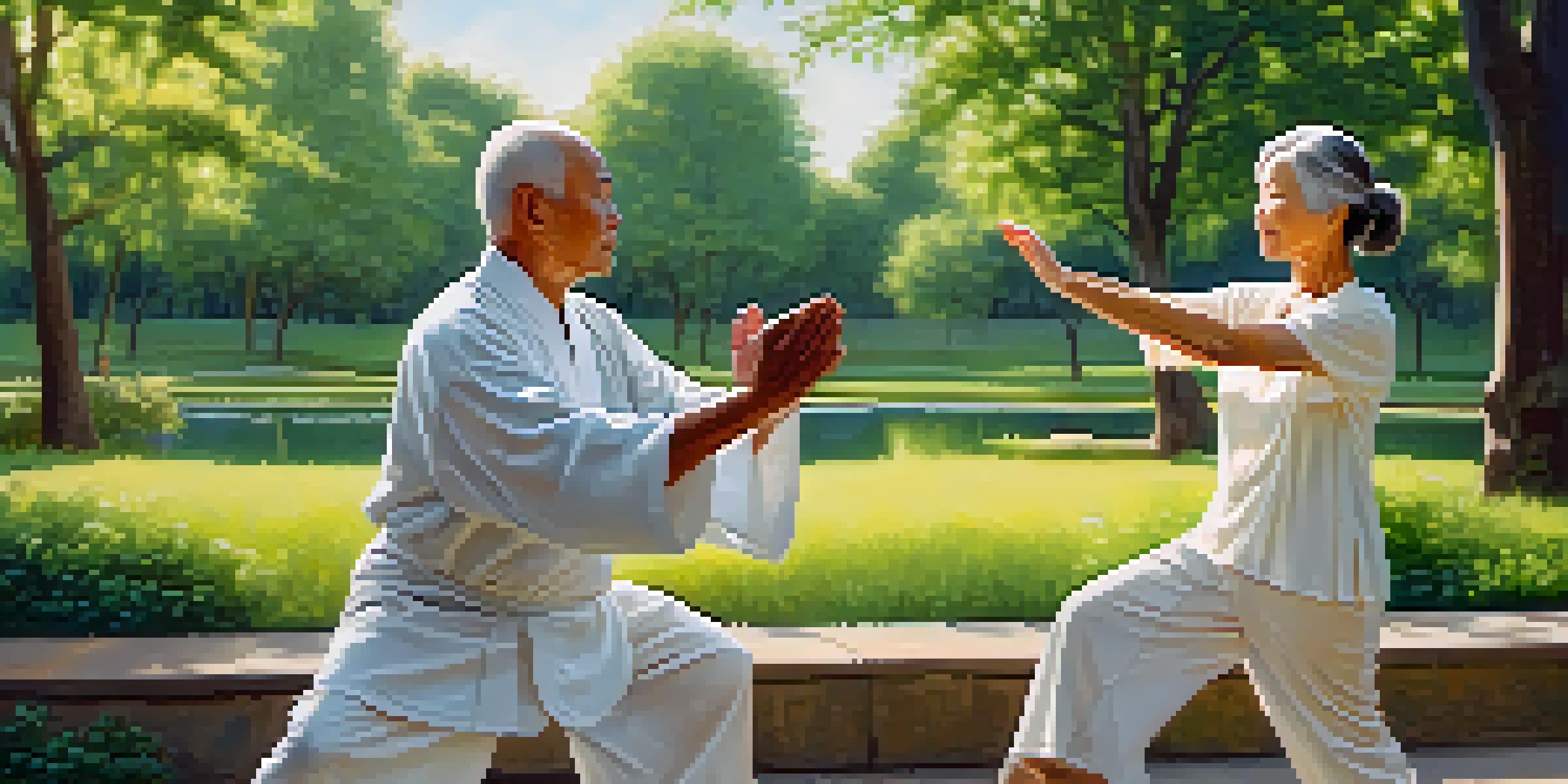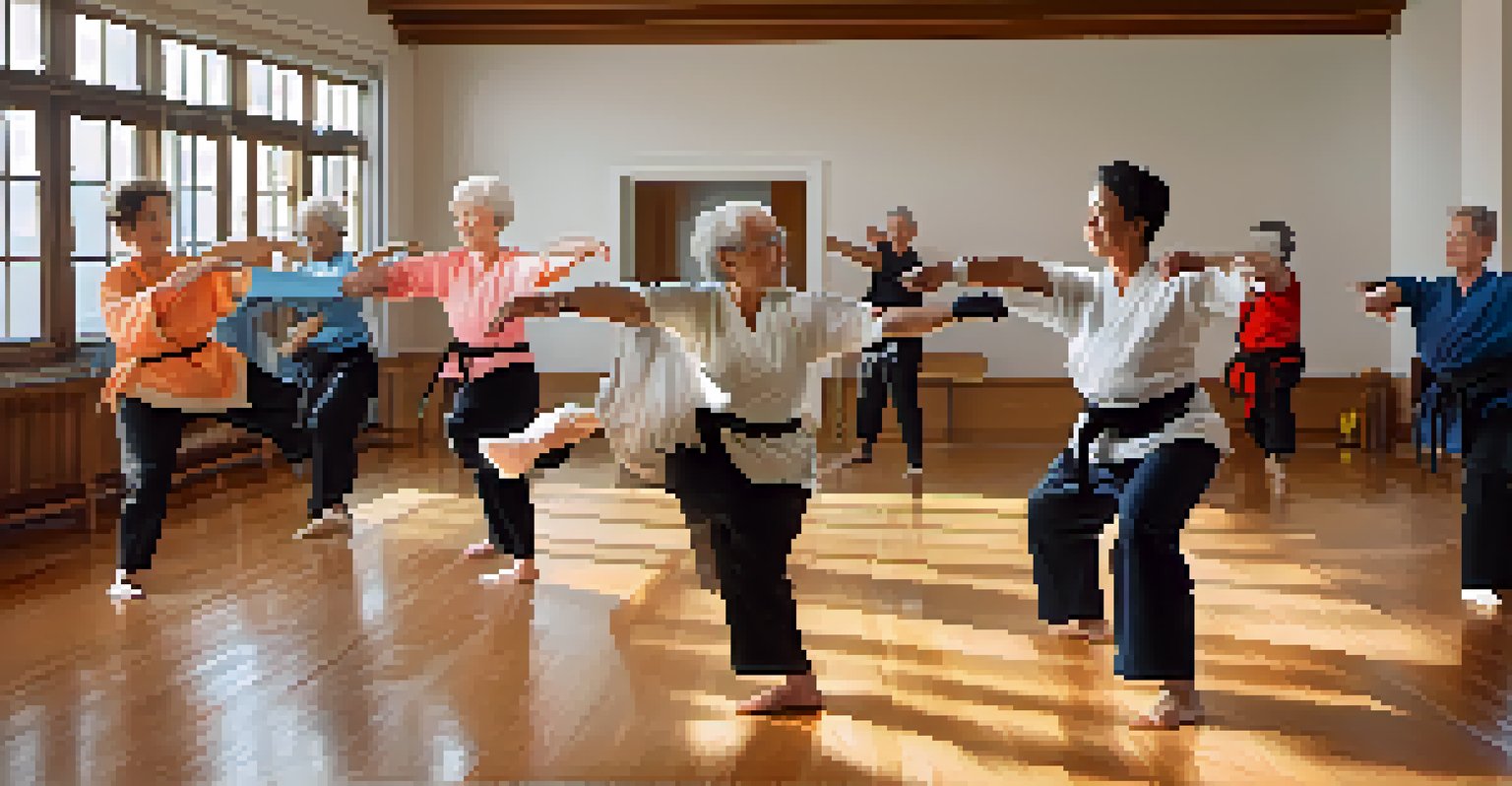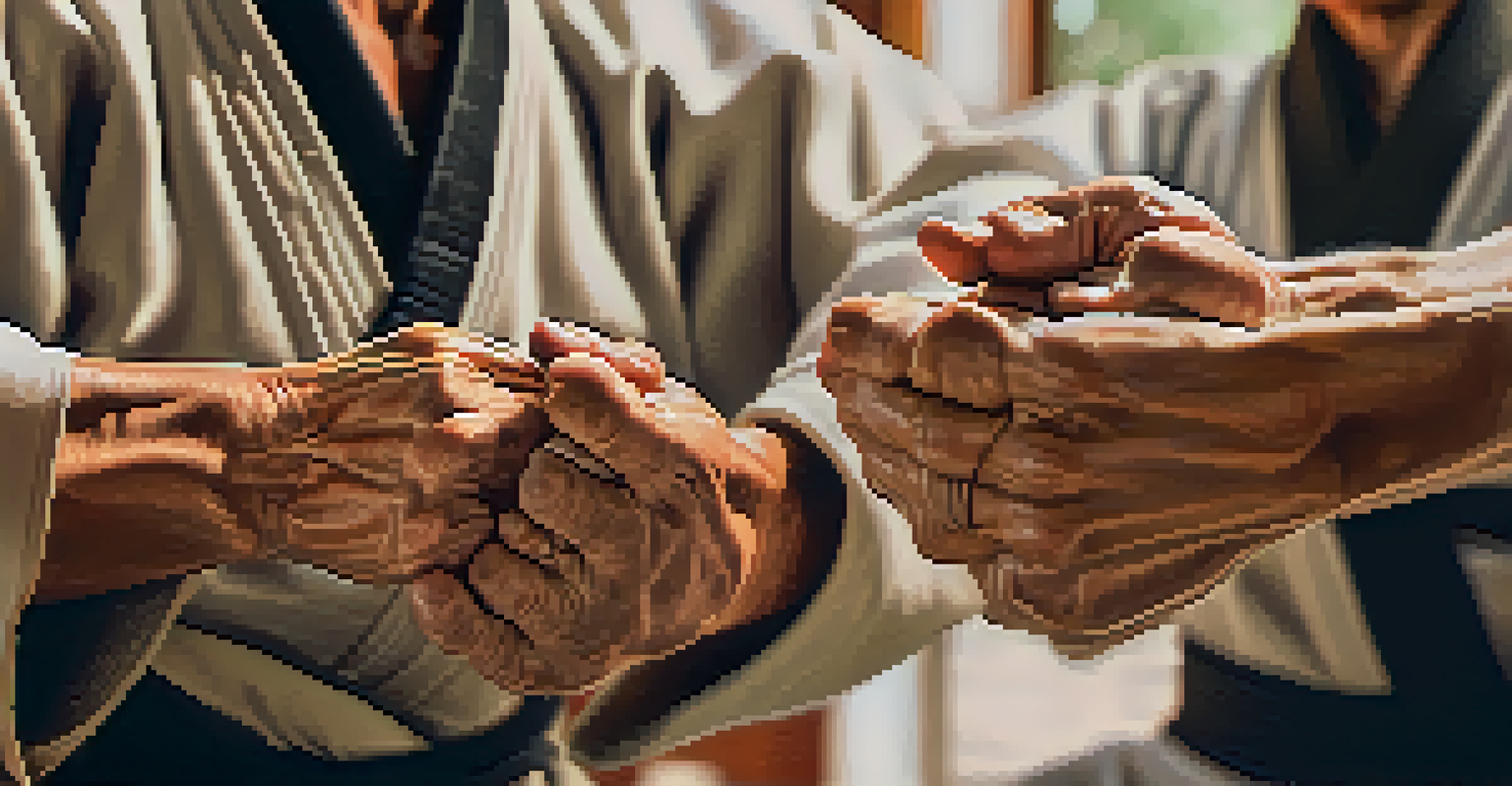Martial Arts for Seniors: Enhancing Health and Longevity

Understanding Martial Arts: A Gentle Approach for Seniors
Martial arts often conjure images of intense training and competition, but many forms are perfectly suited for seniors. These practices focus on balance, flexibility, and mindfulness, making them an excellent choice for older adults. In fact, disciplines like Tai Chi and Aikido emphasize slow, controlled movements that help enhance physical health while being gentle on the body.
Martial arts is not about the martial arts. It's about the journey you take to get there.
Participating in martial arts can bring a sense of community and belonging, which is vital for emotional well-being. Classes often foster friendships and support among participants, making it more than just a workout; it’s a social activity. This camaraderie can help combat feelings of isolation that some seniors may experience.
Moreover, martial arts can be adapted to different fitness levels, ensuring inclusivity. Whether you're a complete beginner or have some experience, there’s a style and pace that can work for you. This adaptability encourages seniors to engage in physical activity without fear of injury or overwhelming challenges.
Physical Benefits: Strengthening Body and Mind
Engaging in martial arts can significantly improve physical health, particularly for seniors. Regular practice enhances strength, flexibility, and coordination, which are essential for preventing falls and maintaining independence. Over time, these improvements can lead to increased stamina and better overall physical fitness.

But the benefits extend beyond the physical realm. Martial arts training also sharpens mental acuity, boosting memory and concentration. The focus required during practice helps keep the mind active, which is crucial as we age, potentially warding off cognitive decline.
Martial Arts Enhance Physical Health
Practicing martial arts improves strength, flexibility, and coordination, which are vital for maintaining independence in seniors.
Additionally, martial arts often involve learning new techniques and forms, which can be stimulating and rewarding. This mental engagement not only makes the training enjoyable but also provides a sense of accomplishment, reinforcing self-esteem and motivation to keep moving.
Mental Well-Being: Building Confidence and Resilience
Martial arts training can instill a profound sense of confidence in seniors. As they learn new skills and techniques, many participants discover a newfound sense of empowerment, translating into their daily lives. This boost in confidence can lead to increased participation in social activities and a more active lifestyle.
The body achieves what the mind believes.
Moreover, martial arts often teach valuable lessons in discipline and perseverance. Seniors learn that progress may be gradual, and that's perfectly okay. This understanding can foster resilience, helping them navigate challenges both on and off the mat with a positive mindset.
The meditative aspects of martial arts, such as controlled breathing and mindfulness, also contribute to mental well-being. These practices can alleviate stress and anxiety, promoting a calmer state of mind. This holistic approach to health helps seniors feel more balanced and centered, enhancing their overall quality of life.
Enhancing Flexibility: A Key to Independence
One of the standout benefits of martial arts for seniors is improved flexibility. Many martial arts practices incorporate stretching and mobility exercises that can help maintain and even increase range of motion. This is particularly important as flexibility tends to decrease with age, leading to stiffness and reduced mobility.
With increased flexibility, seniors can perform everyday activities with greater ease, from bending down to tie shoes to reaching for items on high shelves. This enhanced mobility can significantly contribute to maintaining independence, allowing seniors to continue living active lives without relying on others for assistance.
Boosting Mental Well-Being
Martial arts training fosters confidence, resilience, and mindfulness, contributing to better mental health for seniors.
Additionally, many martial arts forms focus on balance, which is crucial for fall prevention. A heightened sense of balance, combined with improved flexibility, equips seniors with the skills needed to navigate their environment safely and confidently.
Community and Social Connections: Finding Your Tribe
Joining a martial arts class can be a fantastic way for seniors to meet new people. These classes often create a supportive environment where friendships can flourish, and participants can share experiences and encouragement. The social aspect is just as important as the physical training, providing a sense of belonging.
Many martial arts schools also host events, workshops, and competitions that further foster community engagement. Such opportunities allow seniors to bond over shared experiences and celebrate each other’s progress. This sense of community can significantly boost motivation and commitment to regular practice.
Furthermore, being part of a group can help combat feelings of loneliness and isolation that some seniors face. Building these connections not only enriches their martial arts journey but also contributes positively to their mental and emotional health.
Safety Considerations: Practicing with Care
While martial arts offer numerous benefits, safety should always be a priority, especially for seniors. It's crucial to choose classes designed for older adults, where instructors are trained to accommodate varying fitness levels and physical limitations. A good instructor will ensure that all movements are performed safely and correctly.
Before starting any martial arts program, seniors should consult with their healthcare provider, particularly if they have pre-existing health conditions. This step ensures that the chosen practice aligns well with their overall health and fitness goals. Transparency with instructors about any physical concerns is also essential for a safe training experience.
Building Community Connections
Joining martial arts classes helps seniors form friendships and combat feelings of isolation, enhancing their overall well-being.
Finally, it's important for seniors to listen to their bodies and progress at their own pace. Martial arts should be enjoyable and fulfilling, never a source of stress or injury. With the right mindset and approach, seniors can reap the many rewards of martial arts while safeguarding their health.
Getting Started: Finding the Right Class or Style
For seniors interested in exploring martial arts, the first step is to find a suitable class or style. Many community centers and local studios offer beginner classes specifically tailored for older adults. Researching different styles can help determine which one resonates the most, whether it’s Tai Chi for its gentle movements or Karate for its structured approach.
Attending a trial class can also be beneficial. This allows seniors to experience the environment, meet instructors, and gauge the class dynamics before committing. It’s also an opportunity to see if the pace and approach fit their comfort level and goals.

Lastly, don’t hesitate to ask questions! Instructors are usually more than willing to discuss their teaching methods and how they cater to seniors. Finding the right fit is crucial for a fulfilling martial arts experience, making it easier to enjoy the journey ahead.